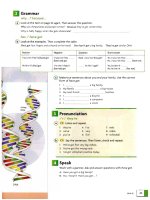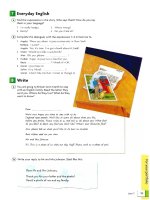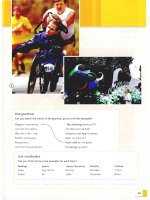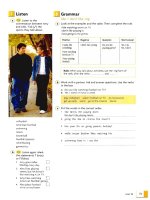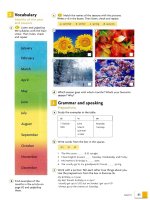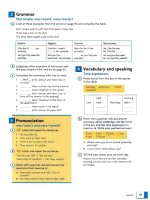Big english american 3 2nd students book
Bạn đang xem bản rút gọn của tài liệu. Xem và tải ngay bản đầy đủ của tài liệu tại đây (10.57 MB, 139 trang )
H
S
I
L
G
EN
2ND EDITION
3
Contents
Unit
Welcome to Class!
pp. a–d
1 Wake Up!
pp. 4–15
2 A Lot of Jobs!
pp. 16–27
3 Working Hard!
pp. 28–39
Checkpoint
Vocabulary
Structures
Rooms: bathroom, bedroom, kitchen, living room
Furniture: couch, dresser, table, sink
Clock times: eight o’clock, nine o’clock, seven o’clock, ten
o’clock
Activities: brush my teeth, do homework, eat lunch, get up,
go to bed, school starts, watch TV
I always get up early on school days.
I usually eat breakfast with my family.
Daily routines: brush my teeth, do my homework, eat
breakfast, feed the cat, get dressed, play soccer, play video
games, wake up, wash my face, watch TV
Times: seven o’clock, seven ten, seven thirty, seven forty-five
What does he do before/after school?
He eats breakfast before/after school.
Jobs: cashier, chef, farmer, firefighter, mail carrier, nurse,
police officer, scientist, teacher, waiter
Places: farm, fire station, hospital, laboratory, police station,
restaurant, store, school
What does she do?
She’s a firefighter.
Where does he work?
He works at a fire station.
What do your sisters do?
They’re chefs.
Chores: clean my room, do the dishes, feed the fish, make my
bed, practice the piano, study for a test, take out the trash,
walk the dog
Adverbs of frequency: always, never, usually, sometimes
What does she have to do?
She has to feed the fish.
What do you have to do?
I have to clean my room.
We always/usually/sometimes/never take out
the trash.
Animals: bear, camel, deer, lizard, owl, penguin, sea lion,
shark, toucan
Habitats: desert, forest, ice and snow, jungle, lake, mountain,
ocean, rain forest
What can a bear do?
It can swim. It can’t fly.
What can owls do?
They can fly. They can’t climb.
Can a penguin jump?
Yes, it can./No, it can’t.
Can lizards swim?
Yes, they can./No, they can’t.
Weather: cloudy, cold, cool, hot, rainy, snowy, sunny, warm,
windy
Clothes: boots, coat, gloves, hat, raincoat, sandals, scarf,
shorts, sunglasses, sweater, umbrella
Times: today, yesterday
What’s the weather like today?
It’s hot and sunny.
What was the weather like yesterday?
It was windy. Leaves were everywhere.
Verb senses: feels, looks, sounds, smells, tastes
Adjectives: awful, bad, beautiful, delicious, good, horrible,
nice, soft, sweet, terrible, tight
How does the apple pie taste?
It tastes delicious.
How do your new shoes feel?
They feel tight.
Food: bread, cucumber, green peppers, lettuce, mushrooms,
mustard, olives, onions, pizza, sandwich, tomato sauce, turkey
Is there any pizza?
Yes, there is some pizza./No, there isn’t any
pizza.
Are there any sandwiches?
Yes, there are some sandwiches./No, there
aren’t any sandwiches.
Healthy living: eat/have breakfast, eat/have a healthy lunch,
drink water, get any exercise, get enough sleep, ride a bike
Did you get enough sleep yesterday?
Yes, I did./No, I didn’t.
Places: aquarium, art gallery, concert hall, dairy farm,
national park, museum, theater, zoo
Verbs: heard, learned, liked, looked, saw, went
Where did you go?
I went to an art gallery.
What did she see?
She saw a play.
Did they like it?
Yes, they liked it./No, they didn’t like it.
Units 1–3 pp. 40–43
4 Amazing Animals
pp. 44–55
5 Wonderful Weather!
pp. 56–67
6 Smells Good!
pp. 68–79
Checkpoint
Units 4–6 pp. 80–83
7 Fabulous Food!
pp. 84–95
8 Healthy Living
pp. 96–107
9 School Trips!
pp. 108–119
Checkpoint
Units 7–9 pp. 120–123
Cambridge Young Learners English: Movers Practice Paper pp. 124–132
Cutouts pp. 133–138
CLIL: Content and Culture
Writing
Phonics
Values
I can...
Life Science: Keeping clean
bacteria, cough, decay, germs, healthy, sick,
sneeze
Around the World: Time zones
different, map, time zone
Sentence:
Subjects and
Verbs
a_e, i_e, o_e
cake, face, game,
shape
bike, like, time, ride
bone, home, note
Do your
chores.
...use words for daily activities.
...use before and after to talk about when things
happen.
...talk about what I do every day.
...write sentences with subjects and verbs.
Social Science: Creative jobs
create, drawings, galleries, materials, paintings,
photo shoot, professional, work of art
Around the World: Communities
be proud of, collect, community, contest, donate,
get lost, trash
Sentence:
Compound
Subjects and
Verbs
sm, st, sp, sk
smart, smile, smoke
star, stop, storm
space, Spain, spoon
skates, ski, skin
Respect
others.
...use job words.
...use what and where to ask and answer about what
people do and where they work.
...talk about what people do and where they work.
...write sentences with compound subjects or verbs.
Math: Pocket money
adult, cash, cost, earn, let (someone) know, save,
stranger
Around the World: Work
bucket, fire, forest, handle, lamp, oil, pump,
stove, wind, wood
Paragraph: Titles
ay, oy
day, May, pay, ray,
say, way
boy, joy, soy, toy
Always be
happy to
help.
...use words for chores and other kinds of work.
...use have to to talk about how often people do
things.
...use always, usually, sometimes, and never to talk
about chores.
...use capital letters in titles.
Life Science: Camouflage
blend in, bottom of the ocean, hunt, stone,
tree bark
Around the World: Pets
alligators, canaries, geckos, goldfish, parakeets,
snakes, tarantulas
Paragraph: Topic
Sentences
ea, oi, oe
bean, eat, meat
peach, sea, tea
boil, coin, oil
foe, toe
Protect
animals
and their
habitats.
...use words for animals and where they live.
...use can to ask and answer questions about what
animals can do.
...talk about what animals can do and where they
live.
...write topic sentences.
Geography: Climate
average, climate, degrees Celsius, desert, dry,
extreme, mild, minus
Around the World: Weather
average, hot springs, rain forest, rink, sand
dunes, temperatures, tropical
Paragraph:
Detail Sentences
sc, sw, sn, sl
scar, scarf, scout
swan, sweet, swim
snack, snail, snow
sleep, slim, slow
Prepare
for the
weather.
...use words for the weather and what clothes people
wear in different types of weather.
...use is and was to ask and answer about the
weather today and yesterday.
...talk about the weather around the world and what
people wear.
...write detail sentences.
Life Science: Animal senses
avoid, brain, danger, echo, information, senses,
sound waves, taste buds, tongue
Around the World: Jobs
awful, clean, fresh, smelly, stink, take care of, wet
Paragraph: Final
Sentences
fl, pl, gl, bl
flag, flip-flops, fly
plant, play, plum
glad, glass, glow
black, block, blow
Try new
things.
...use words for how things look, feel, taste, smell, or
sound.
...use verbs and adjectives to talk about the five senses.
...talk about the five senses.
...write final sentences.
Science: Vitamins
blood, bone, brain, energy, healthy, iron, muscle,
skin, teeth, vitamin
Around the World: Global food
bake, boil, dough, fry, oil, pickled, soup, spicy,
steam
Paragraphs
br, cr, dr, fr, gr, pr, tr
bread, brick
cream, cry
dream, drive
frog, from
grass, green
train, troll
Try
different
foods.
...use food words.
...use some and any to ask and answer questions
about food.
...ask and answer about food.
...write a paragraph about my favorite meal.
Science: Keeping healthy
active, activities, body, burn, calorie, measure,
put on weight
Around the World: Strange sports
contest, net, puck, race, regatta, team
Combining
Sentences with
and, but, or
all, au, aw
all, ball, call, tall, wall
haul, Paul
claw, draw, law, yawn
Get
exercise.
...use words for healthy and unhealthy habits.
...use did and didn’t to ask questions about healthy
and unhealthy habits.
...ask and answer about healthy and unhealthy habits.
...combine sentences with and, but, and or.
Art: Paintings
artist, colorful, happy, impressionist, painter, sad,
strange
Around the World: Stage performances
dramatic, flamenco, open-air theater,
performance, play, popular, puppet, show, stage
Sentence:
Subjects, verbs,
and objects
nt, ld, nd, st
ant, plant, tent
child, cold, old
band, hand, sand
chest, fast, nest
Recognize
your
talents.
...use words for places to visit on a school trip.
...ask and answer questions using the past simple.
...talk about school trips.
...write sentences with a subject, verb, and object.
23
Big English
Song
From the mountaintops to the bottom of the sea,
From a big blue whale to a baby bumblebee –
If you’re big, if you’re small, you can have it all,
And you can be anything you want to be!
It’s bigger than you. It’s bigger than me.
There’s so much to do, and there’s so much to see!
The world is big and beautiful, and so are we!
Think big! Dream big! Big English!
So in every land, from the desert to the sea,
We can all join hands and be one big family.
If we love, if we care, we can go anywhere!
The world belongs to everyone; it’s ours to share.
It’s bigger than you. It’s bigger than me.
There’s so much to do, and there’s so much to see!
The world is big and beautiful, and so are we!
Think big! Dream big! Big English!
It’s bigger than you. It’s bigger than me.
There’s so much to do, and there’s so much to see!
The world is big and beautiful and waiting for me.
A one, two, three…
Think big! Dream big! Big English!
Big English Song
Welcome to Class!
4
1
Listen and read. What does Luke’s uncle do?
When do you
usually watch TV?
When do you
usually go to bed?
I usually go
to bed at
3:00 in the
morning.
I usually watch TV at
3:00 in the afternoon.
Goodnight.
1
It’s Saturday. Luke’s uncle is visiting
from Australia. Luke is happy. He
wants to know about his uncle.
Good morning. When
do you usually get up?
2
Goodnight... 3:00
in the morning?
So when do you usually
have breakfast?
I usually have
breakfast at
12:00 in the
afternoon.
12:00 in the
afternoon?
I’m a doctor. I
work at night!
Good morning. I
usually get up at
11:00 in the morning.
3
4
11:00 in the morning?
a Welcome Unit
Oh Luke!
Welcome to Class!
2
3
Look at the story. Circle T for true or F for false.
1 Luke’s uncle goes to bed at 3:00.
T
F
2 Luke’s uncle eats breakfast at 9:00.
T
F
3 Luke’s uncle watches TV at 6:00.
T
F
4 Luke’s uncle gets up at 11:00.
T
F
Read and write.
couch
4
dresser
sink
table
1 The
is in the kitchen.
2 The
is in the living room.
3 The
is in the bathroom.
4 The
is in the bedroom.
Look and write do or does. Then answer the question.
1 When
Luke’s uncle usually get up?
At:
2 When
Luke’s uncle usually eat breakfast?
At:
3 When
Luke and his uncle go to bed on Saturday?
At:
4 When
Luke’s uncle usually watch TV?
At:
5 When
Luke and his uncle get up on Sunday?
At:
Welcome Unit b
Welcome to Class!
5
5
Listen and number in order.
a brush teeth
c go to bed
b eat lunch
d school start
f watch TV
e get up
g do homework
6
6
Listen again. Draw the times.
7
Work with a partner. Ask and answer.
When do you
brush your teeth?
c Welcome Unit
I brush my teeth
at 7 o’clock.
Welcome to Class!
7
8
Listen and number in order. Then say.
a
b
I always get up early on
school days.
c
I usually eat breakfast
with my family.
d
I usually get my backpack
ready the night before school.
9
I always go to school
at 8:00.
Write about you.
1 I usually get up at
.
2 I have breakfast at
.
3 I usually watch TV at
4 I go to bed at
10
.
.
Play the game.
7:00
2:00
I eat st.
fa
break
I do my
homework
.
Welcome Unit d
11
unit
Wake Up!
Vocabulary
I will learn to name daily routines and times.
8
Song Time!
9
1
Listen, look, and say.
Monday, May 13
eat
3 breakfast
4
get
dressed
wake up
1
brush my
teeth
5
wash my
face
2
do my
8 homework
2
4 Unit 1
6
9
Play the time game.
feed the
cat
play
soccer
10
play video
7
games
watch TV
Song
I will learn to ask and answer about daily routines and times.
10 11
3
Listen and sing. What does Kate do?
Hurry, Kate!
It’s Monday, 7:30.
Kate has to wake up.
Her mom sees the clock and says
Wake up, sleepy head.
Kate has her backpack
And she has her lunch.
What time is it now?
Oh, no, it’s time to go!
Go, go, go! Hurry, Kate!
Hurry, Kate! You can’t be late!
Chorus
Kate eats breakfast, she gets dressed.
It’s 7:45.
It’s time to go to school.
And she can’t be late!
Chorus
4
Read, match, and say.
Ask and answer.
1 7:00
a seven forty-five
2 7:30
b seven fifty-five
3 7:45
c seven o’clock
4 7:55
d seven thirty
5 5:25
e five twenty-five
6 4:10
f four fifteen
7 4:15
g four ten
When does
she wake up?
She wakes up at
seven o’clock.
Which activities do you do inside?
Which do you do outside?
Unit 1 5
Story
I will read a story about daily routines and times.
13
Listen and read. What does Luke do after school?
5
I Love Mondays!
Good morning,
Mom! What
day is it today?
Before lunch, at
eleven ten, I have
art. Art is fun!
But...
It’s Monday.
Hooray! I love
Mondays!
1
Luke wakes up and goes into
the kitchen.
We draw
pictures. We
paint. It’s great!
2
Before school, Luke always
eats breakfast.
After lunch, at two fifteen, we
have English. I love English!
But today...
But Luke...
3
After breakfast, he brushes his
teeth. Then he washes his face.
6 Unit 1
4
He gets dressed.
After school, we
play soccer or
basketball...
5
6
LUKE!
What, Mom?
He puts on his shoes. He’s
ready for school.
6
Today’s a
holiday! There’s
no school!
But there’s no school today!
Read and say before school or after school.
1 Luke eats breakfast.
2 Luke gets dressed.
3 Luke plays soccer.
4 Luke puts on his shoes.
5 Luke wakes up.
6 Luke plays basketball.
Do you like Mondays? Why/Why not?
What different things do you do on
different days?
Unit 1 7
Language in Action
I will listen to a dialog about daily routines and times.
14
7
8
Listen and read. Then say.
Jenna:
Hi, Ethan. Do you want to get
together after school today?
Ethan:
Sorry. I can’t. I’m busy on
Tuesdays.
Jenna:
Really? What do you do?
Ethan:
At 3:30, I have piano lessons. At 4:15, I go to soccer
practice. Then I go home.
Jenna:
Oh. What do you do after that?
Ethan:
I do my homework, clean my room, and feed the
dog. Then at 7:00, we eat dinner.
Jenna:
Wow! You are busy.
Look at 5. Ask and answer with a partner.
What does Luke
do before school?
He wakes up,
eats breakfast, ...
15
9
8 Unit 1
Listen and stick. Number the pictures.
Grammar
I will learn to use before and after to ask and answer about daily routines.
What does he/she do before/after school? He/She eats breakfast before/after school.
What do you do before/after school?
10
I do my homework before/after school.
Look at Claudia’s schedule. Write before or after.
Claudia’s Schedule
6:30
6:45
7:00
7:15
7:30
wake up
get dressed
eat breakfast
brush my teeth
go to school
3:15
3:30
4:45
5:30
6:30
get home
watch TV
do my homework
play soccer
eat dinner
1 Claudia gets dressed
school.
2 Claudia does her homework
school.
3 Claudia brushes her teeth
4 Claudia plays soccer
5 Claudia eats breakfast
11
12
school.
school.
school.
Read and match. Make sentences.
1 We eat breakfast before
a at 5:00 in the afternoon.
2 I wake up at
b we get dressed.
3 Paula washes her
c after school, at 4:15.
4 Tim does his homework
d face at 7:50 in the morning.
5 Sandra plays video games
e 6:45 in the morning.
Look at 10. Talk about Claudia’s schedule with
a partner.
Claudia wakes up at
6:30 in the morning.
She gets dressed at 6:45.
Unit 1 9
Content Connection Life Science
I will learn about keeping clean.
17
13 Listen and read. What are bacteria?
Keep It
Clean!
CONTENT WORDS
bacteria cough
decay germs
healthy sick sneeze
Wash Your Hands
Take a Shower
Brush Your Teeth
When your parents
tell you to take a
shower, they are
giving you good
advice. Wash your
face, behind your
ears, and under
your arms. Be sure
to wash your whole
body well. Use warm
water and soap to
wash away bacteria.
Bacteria are tiny
living things that can
make you sick.
14
To keep your teeth
strong and healthy,
be sure to brush them
twice a day. Brush in
the morning when
you wake up. And
brush at night before
you go to sleep.
Brushing your teeth
cleans away bacteria
that can cause tooth
decay. It’s important
to brush your teeth
for at least two
minutes at a time.
Every day, our hands
pick up millions of
germs that can make
us sick. Be sure to wash
your hands with soap
and water for at least
twenty seconds. Wash
your hands before you
eat, after you visit the
bathroom, after you cough
or sneeze, and any other
time your hands get dirty.
Washing your hands,
your
showering, and brushing
s
teeth are three easy thing
ep
ke
to
y
da
you can do every
.
hy
yourself clean and healt
Look at 13. Read and circle T for true or F for false.
1 Bacteria can make you sick.
T F
2 Wash your hands only once a day.
T F
3 Wash your hands after you take a shower.
T F
4 Brush your teeth for at least two minutes at a time.
T F
5 Brush your teeth five times a day.
T F
What other things can you do to stay healthy?
Where can we learn about staying healthy?
10 Unit 1
Culture Connection Around the World
I will learn about time zones.
19
15 Read and complete. Then listen and check.
Time Zones
Do You Know What Time It Is?
Is it the same time everywhere in the world? No, it’s not.
That’s because the world is divided into time zones. Look at
the map of the United States. It has four different time zones.
1:00 in the afternoon
New York
It’s 1:00 in New York, and
Manuel and his friends
are finishing their lunch.
In Texas, it’s 12:00, and
Maria is just finishing
math class.
John, in Montana, is
hungry and is thinking
about lunch. He looks at
the clock. It’s only 11:00 in
the morning!
Montana
California
16
And for Kara, in
California, it’s only 10:00
in the morning.
two hours later
five more hours later
:00 in New
Now it’s
York, and school is over.
Manuel is playing soccer.
:00 at night now
It is
in New York, and Manuel
is finishing his homework.
:00, and
In Texas, it’s
Maria is still in school.
:00, and
In Texas, it’s
Maria is eating dinner.
:00 in Montana,
It’s
and John is finishing
his lunch.
In Montana, it’s now
:00, and John is
making dinner with his
dad.
Kara, in California, looks
at the clock, and it’s
:00. Hooray!
It’s lunchtime!
In California, Kara is
playing with her sister.
:00.
It’s
Work with a partner. Ask and answer.
1 When it's 6:00 in the evening in Montana, what time is it in
California?
2 Manuel wakes up at 7:00 in the morning. What is Kara
doing when Manuel wakes up?
3 How many time zones does your country have?
It’s ten o’clock in the morning where
you are. Find out what time it is in
Buenos Aires, Cairo, and Sydney.
Unit 1 11
Writing Sentence: Subjects and Verbs
I will learn to write sentences with subjects and verbs.
A sentence has a subject and a verb.
She eats breakfast before school.
She is the subject. Eats is the verb.
17
I ride my bike to school.
I is the subject. Ride is the verb.
Find the subjects and verbs.
Compare with your partner.
1 I watch TV at 5:15.
2 Marcia brushes her teeth at 7:45.
3 We play soccer in the afternoon.
4 They do their homework at 4:30.
5 You eat dinner with your family in the evening.
18
What’s missing, subject or verb? Complete the
sentences and compare with a partner.
brother
1 Bridget
2
3 Her
4 Bridget
5
19
12 Unit 1
cleans
She
Tom
wakes
up at 6:45 in the morning.
eats breakfast at 7:00.
gets dressed at 7:15 in the morning.
her room before school.
plays video games after school.
Write three sentences about your day. Read them to
a partner.
Phonics a_e, i_e, o_e
I will learn to use the sounds a_e, i_e, and o_e.
21
20 Listen, read, and repeat.
1
a_e
2
i_e
3
o_e
22
21 Listen and find. Then say.
face
bike
bone
23
22 Listen and blend the sounds.
1 g-a-me
game
2 c-a-ke
cake
3 t-i-me
time
4 n-o-te
note
5 h-o-me
home
6 sh-a-pe
shape
7 r-i-de
ride
8 l-i-ke
like
24
23 Read aloud. Then listen and chant.
What time is it?
It’s time to play a game.
What time is it?
It’s time to eat cake.
What time is it?
It’s time to ride a bike.
What time is it?
It’s time to go home.
Unit 1 13
Values Do your chores.
I will learn to talk about chores.
26
24 Look, listen, and point.
a
b
I feed the dog
before school.
25
c
I clean my room
after school.
I wash the dishes
after dinner.
Look at 24. What might happen if they don't do
their chores?
Project
26
What chores do you do at home? Copy the chart in
your notebook and ✓. Then ask three classmates
about their chores.
Chore
feed pet
clean my room
wash the dishes
14 Unit 1
Me
1
2
3
Review
27
Read and circle.
Mia likes Fridays! She 1 wakes / wake up on Fridays at seven
fifteen. She washes her 2 face / TV, gets dressed, eats breakfast,
and brushes her teeth 3 before / after school. Mia likes school
on Fridays. 4 Before / After lunch, at 10:30 she has art class. She
likes to draw! At 4:45 she 5 play / plays video games with her
friends – they always play 6 before / after school. At 7:00 she
7
eat / eats pizza with her family. She loves pizza!
28
Play the Silly Sentences game.
6:15 in the evening
eat breakfast
Jack eats breakfast
at six fifteen in the
evening.
That’s silly!
I Can
• use words for
daily activities.
• use before and after
to talk about when
things happen.
• talk about what I do
every day.
• write sentences
with subjects and
verbs.
Unit 1 15
A Lot of
Jobs!
2
Vocabulary
I will learn to name jobs.
27
Song Time!
28
Listen, look, and say.
1
Different Jobs
1 firefighter
6
nurse
2
16 Unit 2
2
chef
7 waiter
police
3 officer
8 scientist
Play the speed game.
4 cashier
9 teacher
5 farmer
10 carrier
Song
I will learn to ask and answer about jobs and workplaces.
29 30
3
Listen and sing. How many jobs are in the song?
Working Together
Chorus
There are many people
In our community.
So many jobs to do,
So many places to be.
Where does he work?
What does he do?
He’s a firefighter,
And he’s very brave, too.
Working together, working hard.
Nurse, farmer, teacher, and chef.
Where does she work?
What does she do?
She’s a nurse,
And she always helps you.
4
Match the jobs in 1 with the places. Make sentences.
a
b
at a hospital
e
c
at a store
f
d
at a fire station
g
h
at a laboratory at a police station at a restaurant
Which job is the
most important?
at a school
on a farm
A teacher works at a school.
A scientist works at a laboratory.
Unit 2 17
Story
I will read a story about jobs.
32
Listen and read. What does Luke’s mom do?
5
Is She a Doctor?
Oh, good. Can
you help us?
Excuse me! Do you
work at this hospital?
I’m looking
for my mom.
Yes, I do.
Luke and his dad are at the
hospital.
1
2
They want to find Luke’s mom.
Oh! Where does she work?
Oh! I’m sorry. Is she sick?
She works here,
at the hospital.
No, she isn’t sick.
She’s at work.
3
Luke’s mom is at work.
18 Unit 2
4
Luke’s mom works at the
hospital.
Oh, I see. What does
she do? Is she a doctor?
Happy Birthday, Mom!
No.
A nurse?
Oh! Thank you!
No.
5
6
Luke’s mom isn’t a doctor or
a nurse.
6
Luke’s mom is a cashier. She
works at a gift shop. It’s her
birthday today!
Read and complete the sentences. Then say.
1 Luke is looking for his
.
2 Luke’s mom works at the
.
3 Luke’s mom isn’t a doctor or a
4 Luke’s mom is a
5 Today it’s Luke’s mom’s
.
.
.
What other people work in a hospital?
What do they do?
What do you think makes a good nurse?
Unit 2 19



